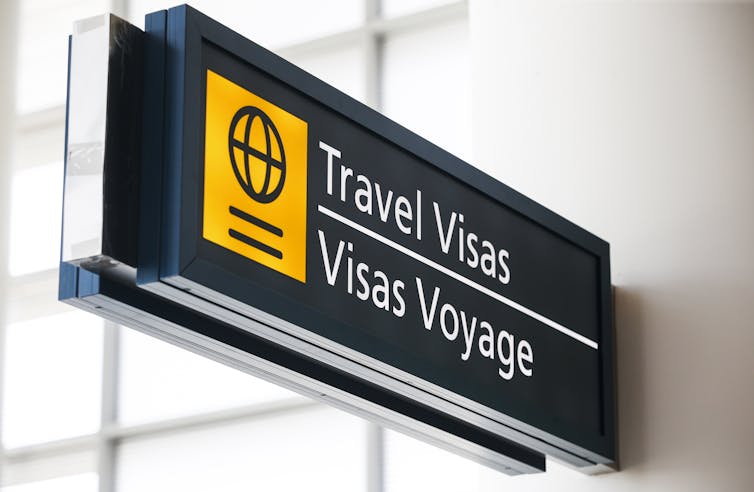
To strengthen it a rapidly growing technology sectorthe Canadian government introduced June 2023 Tech Talent Strategy to attract employees and entrepreneurs. As a part of this strategy, the government announced improvements to the system Visa program for start-ups.
The Start-Up Visa program is designed to help foreign entrepreneurs obtain everlasting residence in Canada. Initially introduced as five-year pilot project in 2013was created to replace the Federal Entrepreneur Program, which had been in operation since the Seventies.
However, the Start-Up Visa program has not proven to be a suitable substitute. Although the program has grown over the years, our evaluation shows that it is still half the size of the Federal Entrepreneur Program in 2010.
The Visa Startup Program has weaknesses in many key areas, including job creation, global trade opportunities and long-term business viability.
(Government of Canada Open Data), CC BY-ND
Creating work
The fundamental concern about the Start-Up Visa program is its ability to create jobs. Unlike the Federal Entrepreneur Program which required you to come to Canada create at least one latest jobthe Start-Up Visa program does not include job creation requirements in its admission criteria.
Job creation is an necessary reason Canada has expanded its pathways to everlasting residence. Immigrants with diverse work experiences can contribute to the growth of Canada’s economy, and business immigration plays an necessary role in this growth.
2019 Statistics Canada survey found that immigrant-owned firms experienced higher net employment growth per firm than firms owned by Canadian-born individuals. Although not all immigrant-owned businesses were began by immigrants who went through the Federal Entrepreneur Program, they accounted for roughly In 2010, 21 percent of all businesses were immigrant-owned.
Innovation and internationalization
In addition to creating jobs, the Start-Up Visa program has additional goals of driving innovation and internationalization. However, it is still unclear whether the Start-Up Visa program will give you the chance to attract revolutionary corporations.
Before the Start-Up Visa program, immigrant-led businesses in Canada were proving revolutionary, although not to the extent suggested by Immigration, Refugees and Citizenship Canada (IRCC).
Survey conducted by Statistics Canada using data from 2011, 2014 and 2017 found that immigrant-owned corporations operating in Canada for greater than 20 years were more likely to implement process, product or marketing innovations and use patents compared to similar Canadian-owned corporations. This suggests that corporations covered by the Federal Entrepreneur Program weren’t necessarily underperforming.

THE CANADIAN PRESS/John Woods
While corporations joining the Start-Up Visa program are expected to exceed these numbers, the lack of knowledge makes it difficult to determine whether this is actually the case. Only a few applicants received investor approval, and most received support from incubators, which suggests that applicants are mainly early-stage startups. While they might be revolutionary, they are going to likely face challenges in terms of survival and longevity.
While there is no concrete evidence to suggest that corporations participating in the Visa Startup Program are more revolutionary, there is evidence to suggest that it has led to increased internationalization, one other of the program’s goals. Since the introduction of the start-up visa many immigrant entrepreneurs moved to Canada from the United States.
Financial Constraints and Debt Obligations
Another area where Visa for Startups falls short is foreign direct investment. While ministerial instructions governing the program do not explicitly state that capital should only come from Canadian investors, a significant variety of designated organizations are based in Canada. This suggests that the program is focused on attracting foreigners to Canada quite than attracting foreigners.
Without specific requirements, the Start-Up Visa program is unlikely to attract significant foreign capital to the country, as foreign entrepreneurs are often required to secure funds from Canadian investors.
However, foreign entrepreneurs who got here under the Federal Entrepreneurs Program brought their very own foreign capital with them. Program required these entrepreneurs to have a net price of at least $300,000. This approach resulted in what they are 3.1 to 4.5 percentage points are more likely to base their ventures on personal funds and networks than their peers born in Canada.
Startup visa applicants
In the face of this criticism, how needed is the Start-Up Visa program? Except by accident false entry visa applicationsthere are fundamental problems with the program.
One issue is whether Visa for Startups distracts potential applicants from other programs. Another query is whether it actually offers a path to everlasting residency for individuals who fail on other paths.
Foreign entrepreneurs who arrive via Start-Up Visa are younger, higher educated and with higher knowledge of English or French than those that went through the Federal Entrepreneur Program.

THE CANADIAN PRESS/John Woods
These features are similar to those who arrive through other routes, the fundamental difference being that applicants for a startup visa have entrepreneurial skills. However, these candidates could easily make the most of other routes comparable to the Express Entry or Provincial Nominee programs.
In terms of the individual quality of candidates, the starter visa does not significantly impact the skill mixture of immigration to Canada. However, it provides the opportunity to invest in foreign start-ups – entrepreneurs only need an ecosystem that can help them prosper. However, their prosperity depends largely on the Canadian startup ecosystem, which essentially makes the startup visa an instrument for investing in dangerous foreign startups.
So what’s next?
The effectiveness of a policy depends on its evaluation. The Federal Entrepreneur Program was closed because many foreign entrepreneurs began small, unscalable businesses that were deemed inappropriate for Canada’s future economic landscape. However, few of them brought foreign direct investment and created jobs.
As many studies show, most startups fail. ABOUT half of all startups that receive angel investment fail inside five years. At what point do we say that a program may not work?
In line with our policy advice, IRCC should conduct a detailed evaluation of the Visa Startup Program to measure its performance against established goals, comparable to job creation, innovation and internationalization, and to set achievable targets for these goals.
As the IRCC closes a path to everlasting residency and opens a latest one, Canadians should ask ourselves not only whether this is consistent with our goals, but also whether those goals are clear, measurable goals that could be assessed over time.

